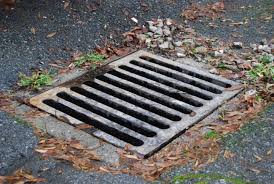 Officers Run Status Report
Officers Run Status Report
Need a stormwater control idea?
Create a beautiful Rain Garden !!
*****
Illicit Discharges
Federal regulations define an illicit discharge as “…any discharge to a Municipal Separate Storm Sewer System (MS4) that is not composed entirely of stormwater…” with some exceptions. These exceptions include discharges from NPDES-permitted industrial sources and discharges from fire-fighting activities. Illicit discharges are considered “illicit” because MS4s are not designed to accept, process, or discharge such non-stormwater wastes.
If you see something that appears to be an illicit discharge, call the Township at 610-857-5969 during office hours. During non-office hours, please contact the Pennsylvania Department of Environmental Protection’s Emergency Response number at 1-800-541-2050 to report a spill or other environmental emergency. It is imperative to stop such discharges from reaching waterways and to trace the discharges to the sources.
Examples of illicit discharges are sanitary wastewater, effluent from septic tanks, car wash wastewaters, improper oil disposal, laundry wastewater and improper disposal of auto and household chemicals.
 *****
*****
Octorara Watershed Association (Facebook)
*******
Chester County Master Watershed Brochure
*****
DRAFT Pollutant Reduction Plan-WEST SADSBURY TWP.-2017-07-06
KNOW THE UPDATED STATE REGULATIONS FOR FERTILIZER
All township residents should be aware of the PA Fertilizer Law that was enacted in July 2022. The changes affected labeling, manufacturing, and application of turf fertilizers.
CLICK HERE to learn more about the Fertilizer Law (PDF)
What do I need to know about fertilizing my lawn?
Homeowners and residents are required to be aware of and to follow the nutrient application rate limits, fertilizer application location restrictions, and best management practices as specified in the law and written on the product label.
How do I know how much fertilizer I should apply to my lawn?
The best way to determine the amount and type of nutrient your lawn and garden needs is to test your soil. Over fertilizing can be detrimental to plant growth and an expensive loss of nutrients that can have negative environmental consequences.
Soil sampling instructions and Soil Test Kits are available from your local Penn State Extension Office on the Resources page.
You must follow prescribed application amounts found on the product label and you may not exceed the following limits:
-
- 0.7 lbs/1000 ft2 of plant available nitrogen per application.
- 0.9 lbs/1000 ft2 of total nitrogen per application, unless it is an enhanced efficiency nitrogen fertilizer
- No phosphate may be applied unless you are establishing, reestablishing, or repairing a turf area or you are using an enhanced efficiency phosphorus fertilizer.
- Application of enhanced efficiency phosphorus, natural organic fertilizer or organic-based fertilizers may not exceed 0.25 lbs/1000 ft2.
What are the fertilizer application restrictions?
Keeping fertilizer where it is needed for plant growth is important for meeting your lawn needs. Therefore, following the best management practices outlined on the product label will help keep your fertilizer in place. A summary of the restrictions is provided below:
-
- Maintain a 15-foot buffer from top bank of lakes, ponds, wetlands, or flowing bodies of water.
- Do not apply near water, storm drains, or drainage ditches.
- Do not apply if a heavy rain is expected.
- Do not apply to impervious surfaces. Promptly sweep any material that lands on an impervious surface back onto turf.
- Do not apply if the ground is frozen or snow covered.
- Apply fertilizer using a properly calibrated device designed for fertilizer.
- Do not use fertilizer to melt snow or ice.
- Do not store or dispose of fertilizer inconsistent with its label or in a manner that would result in a direct discharge to waterways.
*****
Curb Water Pollution
What is stormwater and why is it a problem?
Stormwater is rainfall that runs off of roofs, driveways, lawns, roads, parking lots, sidewalks, farm fields, and other surfaces created or disturbed by manmade activities. This runoff picks up pollutants ( such as dirt, oil, litter, pesticides, fertilizer, etc. ) as it flows across these surfaces and eventually enters local streams. While rainfall is natural, stormwater is manmade.
Large volumes of stormwater overwhelm, erode, and pollute local streams, and flood low lying areas. To lessen these destructive stormwater impacts and help ensure any existing problems do not worsen, municipalities across Chester County have adopted new stormwater management ordinance standards. These new standards are a key tool in reducing these stormwater impacts, safeguarding properties from flooding and erosion, and protecting streams and local water quality.
Residential Solutions to Stormwater Pollution
As stormwater flows over driveways, lawns, and sidewalks, it picks up debris, chemicals, dirt, and other pollutants. Stormwater then flows into a storm sewer system or directly to a lake, stream, river, wetland, or coastal water. Anything that enters our storm sewer system is discharged untreated into the waterbodies we use for swimming, fishing, and providing drinking water. It does not go to the water treatment facility. Polluted runoff is the nation’s greatest threat to clean water. By practicing healthy household habits, homeowners can keep common pollutants like pesticides, pet waste, grass clippings, and automotive fluids off the ground and out of stormwater. Adopt these healthy household habits and help protect lakes, streams, rivers, wetlands, and coastal waters. Remember to share the habits with your neighbors!
10 Ways to Prevent Stormwater Runoff Pollution:
1. Conserve Water by stopping faucet drips
2. Never dump anything down storm drains
3. Pick up after your pet
4. Sweep up driveways and sidewalks
5. Use fertilizers and pesticides sparingly
6. Plant gardens in bare spots
7. Direct rooftop runoff to grass or gardens
8. Check cars for leaks
9. Wash cars at the car wash
10. Compost your yard and organic wastes
Other Ways to Prevent Stormwater Runoff Pollution:
• Properly dispose of hazardous substances, such as used motor oil, cleaning supplies and paint – never pour them down any part of the storm sewer system, and report anyone who does.
• Look for signs of soil and other pollutants, such as debris and chemicals, leaving construction sites in stormwater runoff or tracked into roads by construction vehicles. Report poorly managed construction sites that could impact stormwater runoff to the Township.
• Install innovative stormwater practices on residential properties, such as rain barrels or rain gardens, that capture stormwater and keep it on-site instead of letting it drain away into the storm sewer system.
• Report any discharge from stormwater outfalls during times of dry weather – a sign there could be a problem with the storm sewer system.
• Store materials that could pollute water indoors and use containers for outdoor storage that do not rust or leak to eliminate exposure of materials to stormwater
INFORMATION AND HOW YOU CAN HELP
20 Ways to Protect Streams & Your Streamside Property
Map of Chester County ( MS4 ) Municipalities
Homeowners_Guide_Stormwater_Management
Maintaining Stormwater Facilities
Reducing Stormwater and Flooding
Illicit Discharge Reporting Form
After The Storm
You Can Detect Stream Pollution
Take the Storm Water Runoff Challenge Placemat
